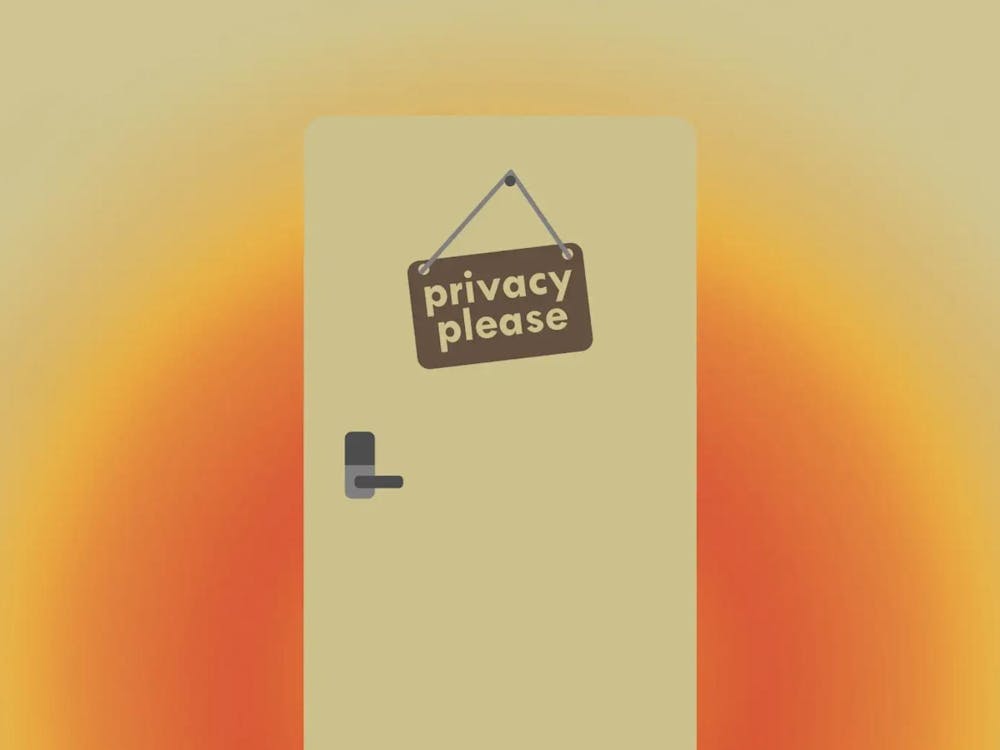Enter through the Scott Stadium doorway labeled Bryant Hall in bronze letters and expect to find a conventional football stadium. A ticket booth off to the side, a sports museum on the left and a Hall of Fame straight ahead - all standard components of new sports centers. Tucked neatly away amid the glitz and glamour of the renovated football stadium are the University Career Services offices, possibly Scott Stadium's best-kept secret.
When plans for the renovated Carl Smith Center at Scott Stadium were drawn, some additional office space was set aside in the complex. Ticket offices, athletic advising and all other athletic support offices were moved to the new facility. Still, additional office space remained and a number of potential office moves were considered.
"The timing worked out," said Elly Tucker, career resources manager and librarian at UCS. "We were looking for bigger office space outside Garrett Hall, and at the same time, the huge stadium project came to light. They needed to fill space and we needed more space."
Interviews in the skyboxes
UCS, a service provided to educate students about career opportunities, planned to fill not just office area, but also envisioned taking advantage of 30 skybox luxury suites for hosting employer interviews. The fourth-floor suites cost a whopping $50,000 per year and must be rented out on a three-year lease, leaving employers paying a grand total of $150,000 for the privilege.
But when the football season is over and the suites will remain empty for the rest of the year, UCS wanted to attract employers from over 500 companies and conduct student interviews inside the skyboxes.
"For over two years, we have experienced a heavy increase in employer interviews," said Angela Wooten, assistant director of business operations for UCS. "We only had 14 interview rooms in Garret Hall compared to over twice as many in the stadium. When the opportunity hit, it was a perfect match."
Rather than send students and employers to overflowing office space in Newcomb Hall or other buildings, all interviews will be conducted in one self-contained area. Employers and students no longer have to worry about parking. A University Transit Service bus line will stop in front of the Bryant Hall entrance beginning Sept. 25. UCS also has allotted parking spaces near the entrance for office visitors.
Open-space offices
Although the expansive, comparatively posh new digs will allow UCS more room than Garrett Hall, the new skybox offices do come with a hefty price tag for rent that makes UCS somewhat uneasy about funding.
"When we were in Garret Hall, we were fully funded," Wooten said. "All we know is that now what normally funded us is not going to cut it anymore."
Before making the switch from the basement of Garrett Hall to the state-of-the-art facility, UCS employees researched similar complexes to serve as a model for the new offices. UCS Director Jim McBride stumbled upon the AMS Learning Center in Manassas and decided to incorporate some elements of AMS's style into the new office space. One such element is the open space - when standing at any point in the UCS office, the entire office is visible.
"We wanted to create a learning environment," McBride said. "We wanted an open office area, we didn't want anything to get in the way. We didn't even want to have anything cluttering the walls," he said, pointing to the perfectly white walls behind him.
"Look at how bright it is!" Donna Ryan, Technology Coordinator and Pre-Professional Advisor, piped in as she pointed to the well-lit space surrounding her desk.
Sharing Ryan's attitude, Wooten believes the change from an office in a basement to an almost entirely open, window-filled setting has done wonders for UCS employees.
"There has been a total uplifting of spirits of the folks who work here," Wooten said. "It has helped us have a better connection with the students."
Skybox interviews and a happier staff are just a few of the perks of the new area. UCS wanted to move their office to the stadium in order to be closer to student residences. The office hopes to attract more than just upper-class students with a location close to first-year dorms.
"The average age of our visitors is lower, and we are seeing more and more first-year students," Tucker said.
Large conference rooms and access to auxiliary space outside the office also provides UCS with new opportunities. Now that UCS has ample space for accommodating a large number of students, the office plans on holding brown-bag lunches and various career-related workshops in the facility.
"We're trying to bring more programs here rather than having to go outside the office to hold events," McBride said.
UCS services
Coupling the new services with the old, UCS expects to be visited by a greater number of students once they discover the office's new location.
"We'll be dealing with a different traffic pattern," Tucker said. "We may even need to expand our office hours. We want to be more than just a career center. We want to provide the best service for each particular student and empower students with skills."
The office does more than just find jobs for graduating students. Over 4,000 books focus on everything from writing resumes and performing online job searches on over 26,000 Web sites to information on careers in specific locations or for specific majors. The very first section of each informative book focuses on the correlation between personalities and career paths. Tucker suggests that before using any of the resources in the center, students start off by finding out about their personal interests.
"Before we talk about careers we have to talk about you," she said. "What are your interests and goals? A lot of students don't know how important it is to know the self. You don't necessarily have to pursue your passion, but your passion should be part of your life style."
To help students obtain a greater self-awareness, Tucker urges students to take one of several personality tests and then sit down with a counselor to discuss the results.
"When you talk about yourself with someone else you learn so much more than you would on your own," she said.
When students take such exams, they may discover that some of their interests in life don't follow a strictly professional route. Because of increased student interest in non-profit organizations, Tucker has increased the collection of resources on careers in that field. For those who venture farther off the beaten path, UCS may still have the answers for them.
"Not everyone is trying to be an investment banker or a doctor. I try to get books that would appeal to a variety of interests, even if they are a little off the wall," Tucker said, as she picked one book from the shelf that highlighted everything from becoming a National Geographic photographer to a dancer.
Career wise
UCS also tries to give students a perspective on their future careers beyond their first jobs. Recently Tucker has added to this section of the library as "strategic job jumping" has secured a stronger presence in the business world. Most people change career fields three or four times, and within these fields they can change jobs up to seven to 10 times, Tucker said.
"Wow, this place is really organized," a student said after getting an overview of all the books in the collection.
Besides a comprehensive library, UCS provides students with a number of computer programs designed to aid them in finding a job, internship or simply building connections. Jobtrak, an online resource, presents students with a database of employers specifically looking to fill positions with students from the University. Students can sign up for interviews using Interviewtrak, a program that has "streamlined the process amazingly," Tucker said. For those looking for other ways to get into the job market, UCS allows students access to the University Career Alumni Network. By using this program, students and alumni can easily connect with one another.
"UCAN provides an automatic network for students who might not know anyone in their prospective field," Tucker said. "Through UCAN they gain information, but at the same time form relationships that might turn into jobs down the road."
Not to be overlooked are less-visible programs already in use by UCS. The office offers students two experiential opportunities through the externship and internship programs. Externships are usually shorter versions of internships, lasting roughly two weeks during winter, spring or summer breaks. The office sets up the externships for the students, while students do more of the work by themselves when securing an internship. Internships present an opportunity for UCS to "teach the job-search process in a smaller version," Tucker said. Tucker encourages all students to consider both of these programs.
"So many students come back from internships or externship and say that the experience changed their lives," she said. "You don't really know what a field is like until you're in it."
The office provides other services, such as "Resumania," in which professionals critique student resumes. Mock interviews give students a chance to view themselves on videotape, and programs such as Minority Career Day reach out to under-represented populations.
With a number of established programs in place, new ideas for the future, an enormous library, computer resources and a brand new facility to house all the activity, the UCS staff has been eager to show off their work to the outside world. Recently UCS showed professionals around the new office in Bryant Hall and afterwards received feedback at an employer panel following the tour.
"One panelist who has visited colleges up and down the east and west coasts stood up in the middle of Minor Hall auditorium to say what he thought," McBride said. "He just said, 'It is the finest facility in the country."




